The Year of Reading Proust discussion

This topic is about
Sodom and Gomorrah
Sodom and Gomorrah, vol. 4
>
Through Sunday, 11 Aug.: Sodom and Gomorrah
message 1:
by
Jason
(last edited Jan 04, 2013 08:24PM)
(new)
-
added it
Sep 30, 2012 04:49PM
 This thread is for the discussion that will take place through Sunday, 11 Aug. of Sodom and Gomorrah, to page 489 (to the paragraph beginning: “By this time, Mme Cottard was fast asleep...”)
This thread is for the discussion that will take place through Sunday, 11 Aug. of Sodom and Gomorrah, to page 489 (to the paragraph beginning: “By this time, Mme Cottard was fast asleep...”)
reply
|
flag
 Remember the Grandmother's distress at a different translation of the Arabian Nights? The names were transliterated so differently that she was very upset. Well, I feel the same about the translation of Sodom and Gomorrah I'm reading. Really, "the lift" rather than "the lift-boy"? And "the Princess of Parma" rather than the Princesse de Parme? Also Moncrieff's versions of the Manager's malapropisms is much funnier.
Remember the Grandmother's distress at a different translation of the Arabian Nights? The names were transliterated so differently that she was very upset. Well, I feel the same about the translation of Sodom and Gomorrah I'm reading. Really, "the lift" rather than "the lift-boy"? And "the Princess of Parma" rather than the Princesse de Parme? Also Moncrieff's versions of the Manager's malapropisms is much funnier. It's nice to be able to identify with the Grandmother.
 I'll have to agree about Moncrieff's translation. The section with the Manager's malapropisms has been one of my favorite passages thus far :)
I'll have to agree about Moncrieff's translation. The section with the Manager's malapropisms has been one of my favorite passages thus far :)
 I agree with Fionnuala in that description of the landscape and the gulf is a gem in last week's section.
I agree with Fionnuala in that description of the landscape and the gulf is a gem in last week's section.I was going to post my photo of the sunset as a proxy to the view of the gulf, but the sunset is mentioned at the beginning of this weeks read.
D'abord j'étais scandalisé de voir qu'elle (Mme Verdurin) et son mari rentraient tous les jours longtemps avant l'heure de ces couchers de soleil qui passaient pour si beaux quand vus de cette falaise....
Here is one of such sunsets..

 Kalliope wrote: "I was going to post my photo of the sunset as a proxy to the view of the gulf, but the sunset is mentioned at the beginning of this weeks read... "
Kalliope wrote: "I was going to post my photo of the sunset as a proxy to the view of the gulf, but the sunset is mentioned at the beginning of this weeks read... "I love that this is a sunset taken from the road between Trouville and Cabourg, near to where La Raspelière might have been located, Kalliope. I've just been reading the same passage and enjoying the description of M Cambremer, who is like a dose of smelling salts to the wife of the premier président, asphyxiated by the amount of tourists in Balbec. Hmm, there's something familiar about that...
 Fionnuala wrote: "Kalliope wrote: "I was going to post my photo of the sunset as a proxy to the view of the gulf, but the sunset is mentioned at the beginning of this weeks read... "
Fionnuala wrote: "Kalliope wrote: "I was going to post my photo of the sunset as a proxy to the view of the gulf, but the sunset is mentioned at the beginning of this weeks read... "I love that this is a sunset ta..."
Exactly!... taken in between Trouville and Cabourg... unforgettable.
 The very funny passage on the nose, le nez, of M. de Cambremer... is this a parody of Edmond de Rostand's Cyrano De Bergerac?
The very funny passage on the nose, le nez, of M. de Cambremer... is this a parody of Edmond de Rostand's Cyrano De Bergerac?
 Kalliope wrote: "The very funny passage on the nose, le nez, of M. de Cambremer... is this a parody of Edmond de Rostand's Cyrano De Bergerac?"
Kalliope wrote: "The very funny passage on the nose, le nez, of M. de Cambremer... is this a parody of Edmond de Rostand's Cyrano De Bergerac?"I've no idea, but I've just been reading that part: you have to feel sorry for poor M. de Cambremer (papa's child!), feeling the full brunt of an unthrottled cruel physical denigration. Ouch! But yes, funny too!
 This is another fascinating extract in which Proust is examining the different degrees and kinds of "snobisme" between the Verdurins, Cottard, Charlus, Mme de Cambremer-Legrandin, the marquise de Cambremer, Morel, etc etc....
This is another fascinating extract in which Proust is examining the different degrees and kinds of "snobisme" between the Verdurins, Cottard, Charlus, Mme de Cambremer-Legrandin, the marquise de Cambremer, Morel, etc etc....All in contrast to the grandmother (and the Narrator) for whom ".. des gens que ma gran-mère eût trouvés tout de suite "très mal" et comme elle ne comprenait pas le snobisme elle eût sans doute été stupéfaite qu'il eût réussi à être épousé par Mlle Legrandin...
 The ghost of Gautier-Vignal and his conversations on music with Proust continue in this weeks section... Again the ballets russes and Diaguilev... etc....
The ghost of Gautier-Vignal and his conversations on music with Proust continue in this weeks section... Again the ballets russes and Diaguilev... etc....Not that Reynaldo Hahn was not unaware of Diaguilev, on the contrary, he also worked with him for a while, but it did not succeed.
This was with Le Dieu Bleu.. , and it was a complete flop and Diaguilev blamed it on Hahn... the big success came later, with Stravinsky... and this would have been in the discussions with G-V.
 Dear me, M. Verdurin is very harsh with poor Saniette isn't he? I wonder if there's something behind this fury?
Dear me, M. Verdurin is very harsh with poor Saniette isn't he? I wonder if there's something behind this fury?
 M Verdurin's bullying manner simply reminds me of Swann and the bullying he suffered from both Verdurins. In fact this whole section with the 'petit clan' reinforces the tragedy of Swann's death, Swann who was so much nobler, so much more a real character than any of these 'types'.
M Verdurin's bullying manner simply reminds me of Swann and the bullying he suffered from both Verdurins. In fact this whole section with the 'petit clan' reinforces the tragedy of Swann's death, Swann who was so much nobler, so much more a real character than any of these 'types'.And how about the reference to Mme de Cambremer's liaison with Swann inserted in the narrative so quietly in the same way his death was announced earlier.
In the first volume, at Mme de Saint-Euverte's musical evening, at which Mme de Cambremer was present and described as a young bride, and when Swann heard the Vinteuil music and then decided to escape the city and go to Combray where he hoped he might see Mme de C again, was it mentioned that they had an affair? And wasn't she mentioned as possibly having had an affair with Saint-Loup? And don't I remember that she was supposed to be dying at one point - or was that her mother-law?
 Fionnuala wrote: "M Verdurin's bullying manner simply reminds me of Swann, in fact this whole section with the 'petit clan' reinforces the tragedy of Swann's death, Swann who was so much nobler, so much more a real ..."
Fionnuala wrote: "M Verdurin's bullying manner simply reminds me of Swann, in fact this whole section with the 'petit clan' reinforces the tragedy of Swann's death, Swann who was so much nobler, so much more a real ..."Yes, I thought we would be seeing a redeemed Mme Verdurin et al, in the kind of pattern that Proust likes to develop, turning things around.
 Kalliope wrote: "Yes, I thought we would be seeing a redeemed Mme Verdurin et al, in the kind of pattern that Proust likes to develop, turning things around. ."
Kalliope wrote: "Yes, I thought we would be seeing a redeemed Mme Verdurin et al, in the kind of pattern that Proust likes to develop, turning things around. ."I'm not holding my breath!
Re food again, wasn't it interesting to see how the narrator compares Mme de Cambremer to la chose fondante et savoureuse when he met her in Balbec but now at La Raspillière, she has become a dry and hard galette normande.
 Fionnuala wrote: "I'm not holding my breath!
Fionnuala wrote: "I'm not holding my breath!Re food..."
Haha.. very good.. I had not noticed...
yamyam.. to both, to the Camembert (I agree with the Lift) and to the galette (but not too hard and dry).
 Note the use of narration at dinner from ML p. 437-439:
Note the use of narration at dinner from ML p. 437-439:Dialogue: Mme. C asks the Narrator about Morel
3rd person omniscient
Dialogue: Mme. C asks the Narrator about Brichot
3rd person omniscient
1st person: the Narrator reflects
Dialogue: Brichot, M. C, Brichot, M. C
3rd person omniscient (but enclosed in parenthesis)
Dialogue continues:
"I know , I've read it (the cure's book) with immense interest," Brichot replied hypocritically.
Which is dramatic irony; as the reader knows (as does the Narrator and anybody listening to Brichot on the train) that this is not true but the person to whom the statement was addressed, M. de Cambremer, is unaware.
So varied, so easy, the narrative voices slide into one another foregrounded by the dialogue.
And perhaps when you see "hypocritically" you can understand Stephen King (who) once said, “The road to hell is paved with adverbs.”
 But there's some real clown-type comedy too - that lovely scene with Charlus who is not too sure whether he understands what is meant by being 'one of us' - what is Verdurin implying - and then that surgical put down when he superciliously points out all his other titles: 'But I saw straight away that you're not used to this kind of thing' Ouch.
But there's some real clown-type comedy too - that lovely scene with Charlus who is not too sure whether he understands what is meant by being 'one of us' - what is Verdurin implying - and then that surgical put down when he superciliously points out all his other titles: 'But I saw straight away that you're not used to this kind of thing' Ouch.
 ·Karen· wrote: "But there's some real clown-type comedy too - that lovely scene with Charlus who is not too sure whether he understands what is meant by being 'one of us' - what is Verdurin implying - and then tha..."
·Karen· wrote: "But there's some real clown-type comedy too - that lovely scene with Charlus who is not too sure whether he understands what is meant by being 'one of us' - what is Verdurin implying - and then tha..."I think the narrator really labours this subject of Charlus's sexual orientation in these scenes. First we have a long passage about Charlus misinterpreting Cottard's wink and then a similar misunderstanding with Verdurin and a further emphasis when Ski explains Charlus' case to Cottard. The narrator seems to want us to see Charlus under this particular light at all costs.
A point which interested me more was Mme Verdurin's approach to the interior decor of the house, an approach the narrator seems to think is more respectful than otherwise. He compares her approach to that of a church architect preferring the simpler carved wooden panels de vieux bois sculpté to the more flashy decor a local curé might choose to order from Paris.
On that very point, I have an anecdote about the church of Saint Jacques in Combray-Illiers (Saint Hillaire in La Recherche, and which incidentally has carvings of scallop shells incorporated into its decor like little madeleines, and which is on the route of the pilgrimage to Saint Jacques de Compostela in Spain).
When we were in Combray earlier this summer, we met an elderly man who turned out to be the grand-son of the real Dr Percepied and who gave us a tour of the church. The altar is an elaborate construction in variegated marble, of imitation gothic design. The elderly man remarked that Proust would have hated it and he took us behind the altar and pointed out the original wall from which the wood panelling had been pulled down to make way for the new marble altar. And in the corner of the back of the church there lay a pile of carved wooden panels de vieux bois sculpté which he said had lain there ever since the redecoration had taken place. He thought the wooden panels would still have been in place when Proust was little but might have been replaced within the period of his visits to Combray-Illiers.
 Fionnuala wrote: "The altar is an elaborate construction in variegated marble, of imitation gothic design..."
Fionnuala wrote: "The altar is an elaborate construction in variegated marble, of imitation gothic design..."
 Kalliope wrote: "Fionnuala wrote:we met an elderly man who turned out to be the grand-nephew of the real Dr Percepied and who gave us a tour of the church.
Kalliope wrote: "Fionnuala wrote:we met an elderly man who turned out to be the grand-nephew of the real Dr Percepied and who gave us a tour of the church."
He also told us that his grandfather was not called Percepied, and that that was the name of the postman. But of course one could imagine Proust thinking that Percepied was a good funny name for a doctor (like M. Bovary?).
 Thanks Kalliope. I wish I'd taken a photo of the fragments of carved wooden panels piled in the corner behind the altar...
Thanks Kalliope. I wish I'd taken a photo of the fragments of carved wooden panels piled in the corner behind the altar...
 Me being a heathen, I was far more interested in the piece of art that was there for the 100th centenary of the first publication of À La Recherche:
Me being a heathen, I was far more interested in the piece of art that was there for the 100th centenary of the first publication of À La Recherche:
 Last week I posted a couple of paintings by Watteau. The art and literature and the gallant scenes of the eighteenth century were mentioned several times.
Last week I posted a couple of paintings by Watteau. The art and literature and the gallant scenes of the eighteenth century were mentioned several times.Now we hear that Paul César Helleu was nicknamed "le Watteau à vapeur" because he painted with the same grace but very fast.
Helleu:
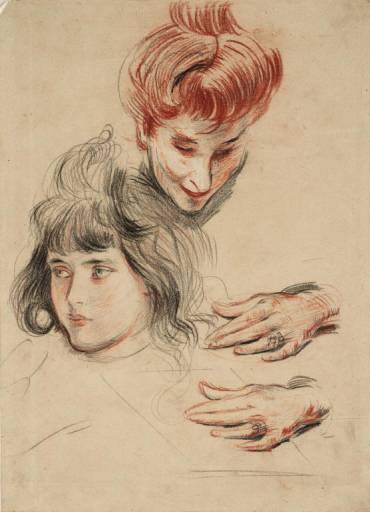
And more Watteau:
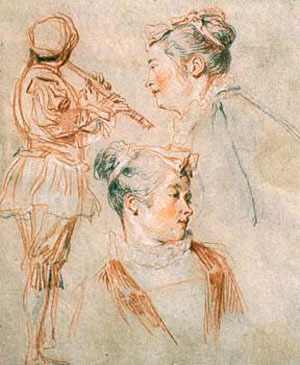

 Kalliope wrote: ".He also told us that his grandfather was not called Percepied, and that that was the name of the postman. But of course one could imagine Proust thinking that Percepied was a good funny name for a doctor (like M. Bovary?). ."
Kalliope wrote: ".He also told us that his grandfather was not called Percepied, and that that was the name of the postman. But of course one could imagine Proust thinking that Percepied was a good funny name for a doctor (like M. Bovary?). ."Thanks, Kalliope. Yes, I meant the real doctor on whom the character of Dr Percepied was based.
Karen, can you remember anything about that exhibit. Wasn't it about costume? And made from scraps of material gathered from the local people, I think...
 I had not encountered the verb "snober" in French before.
I had not encountered the verb "snober" in French before... le docteur.. ne cherchait pas à cacher que Charlus le snobait
And then he goes on to snober himself and show off how well he is treated when he goes to exclusive or socially enclosed places..
 I heard that ''Watteau à vapeur' comment years ago from an art history lecturer but hadn't realised it originated in Proust.
I heard that ''Watteau à vapeur' comment years ago from an art history lecturer but hadn't realised it originated in Proust. A 'bateau à vapeur' is a steamboat, so pretty fast!
Great illustrations, Kalliope.
 Je me rappelle seulement que c'était Mme Samary qui faisait la Zerbine... Saniette says.
Je me rappelle seulement que c'était Mme Samary qui faisait la Zerbine... Saniette says.This is Marie Samary, by Jules Bastien-Lepage:

The notes say that there is no Zerbine in La Chercheuse d'esprit by Favart but that there is in Le Capitaine Fracasse by Gautier.
 Fionnuala wrote: "I heard that ''Watteau à vapeur' comment years ago from an art history lecturer but hadn't realised it originated in Proust.
Fionnuala wrote: "I heard that ''Watteau à vapeur' comment years ago from an art history lecturer but hadn't realised it originated in Proust. A 'bateau à vapeur' is a steamboat, so pretty fast!
Great illustration..."
My understanding of the note is that he was known that way (that is, Proust is just making an echo of this). Interesting that you had heard this already. New to me.
 Kalliope wrote: "Je me rappelle seulement que c'était Mme Samary qui faisait la Zerbine... Saniette says..."
Kalliope wrote: "Je me rappelle seulement que c'était Mme Samary qui faisait la Zerbine... Saniette says..."Mme Samary has the confident, calculating look I imagine Mme Verdurin might have.
 Fionnuala wrote: "Kalliope wrote: "Je me rappelle seulement que c'était Mme Samary qui faisait la Zerbine... Saniette says..."
Fionnuala wrote: "Kalliope wrote: "Je me rappelle seulement que c'était Mme Samary qui faisait la Zerbine... Saniette says..."Mme Samary has the confident, calculations look i imagine Mme Verdurin might have."
Actually, yes, you are right.. she would make a perfect Mme Verdurin..
Her name is funny for me because Verdurin i so very close to Verdulera... which means, literally, Vegetable-seller but which by extension is used to refer to vulgar women.
 Kalliope wrote: ". Her name is funny for me because Verdurin i so very close to Verdulera... which means, literally, Vegetable-seller but which by extension is used to refer to vulgar women. ."
Kalliope wrote: ". Her name is funny for me because Verdurin i so very close to Verdulera... which means, literally, Vegetable-seller but which by extension is used to refer to vulgar women. ."That's ironic considering her remarks about Mme Elstir....
 Karen, can you remember anything about that exhibit. Wasn't it about costume? And made from scraps of material gathered from the local people, I think...
Karen, can you remember anything about that exhibit. Wasn't it about costume? And made from scraps of material gathered from the local people, I think... That's about as much as we were told. A Canadian artist, a woman, but no name - I don't think he could remember the name (he was doing well for 90) - and I loved how the dresses became less and less structured, breaking up into separate pieces....
 Proust describes the Baron's ancient laugh,
Proust describes the Baron's ancient laugh,And he gave a little laugh that was all his own—a laugh that came down to him probably from some Bavarian or Lorraine grandmother, who herself had inherited it, in identical form, from an ancestress, so that it had tinkled now, unchanged, for a good many centuries in little old-fashioned European courts, and one could appreciate its precious quality, like that of certain old musical instruments that have become very rare. ML p. 463
A laugh, a basal and guttural sound, a sincere chuckle that has historical meaning to the Narrator and it spins his imagination like a roulette wheel, "probably..." and round he goes. The imprint of age, of heredity, so important to him, the owning of the past--the aristocracy and it's indelible (born with) stamp of age--a past that he longs for; he pays his time, his respect for what he cherishes the Guermantes have and one would assume he doesn't, but through them. A small wooden instrument, broken gut strings, I can hear names, etymologies...
 Fionnuala wrote: "I think the narrator really labours this subject of Charlus's sexual orientation in these scenes. ·..."
Fionnuala wrote: "I think the narrator really labours this subject of Charlus's sexual orientation in these scenes. ·..."I found interesting to see Charlus out of his customary environment and being a bit lost.... Which makes us think of the importance of context for all those subtle social differences, that the Narrator is recording with so much attention, to make any difference.
 Bayeux is mentioned again, and although it is the Cathedral and the diocèse that is mentioned, as I already posted a couple of photos of the cathedral, now I will post the lovely tapestry.
Bayeux is mentioned again, and although it is the Cathedral and the diocèse that is mentioned, as I already posted a couple of photos of the cathedral, now I will post the lovely tapestry.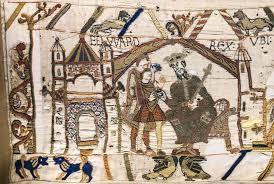
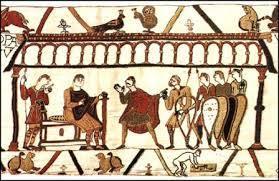
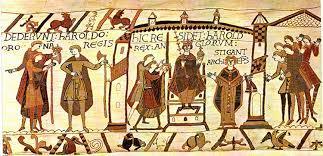
 Karen: Verdurin's bullying of Saniette is gratuitous malice. He just enjoys it (Verdurin, not poor Saniette!)
Karen: Verdurin's bullying of Saniette is gratuitous malice. He just enjoys it (Verdurin, not poor Saniette!)
 Maybe they both enjoy it, in some sort of sado-masochistic way. At times, I feel sorry for Saniette but sometimes I think he is truly pathetic to willingly subject himself to such insults. But of course, the Verdurin both know how to use le bâton et la carotte.
Maybe they both enjoy it, in some sort of sado-masochistic way. At times, I feel sorry for Saniette but sometimes I think he is truly pathetic to willingly subject himself to such insults. But of course, the Verdurin both know how to use le bâton et la carotte.By the way, I think we should rename this discussion forum "Faubourg-St Honoré" and the Group Lounge "La Raspelière".
I had never heard, le Watteau a vapeur. Pretty funny!
 According to the notes in my edition there is an additional incongruence when Charlus says: je sais le portrait de Favart dont vous voulez parler.. because there had been no discussion of a portrait by Favart in the early discussion.
According to the notes in my edition there is an additional incongruence when Charlus says: je sais le portrait de Favart dont vous voulez parler.. because there had been no discussion of a portrait by Favart in the early discussion.So, another example of unfinished editing.
As for Favart:
Charles Simon Favart, (1710-1792), another playwright from the eighteenth century (like Marivaux) and author of La chercheuse d'esprit, discussed in the novel.
He wrote mostly comedies.
From the French wiki and for Fionnuala's interest in her neighbors:
Favart dirige le Théâtre de la Monnaie à Bruxelles, de 1746 à 1748. Le succès fut éclatant, au point que même les ennemis réclamèrent les acteurs les jours où ils ne jouaient pas devant les Français. Mais Madame Favart fut contrainte de s'enfuir pour échapper aux assiduités du maréchal de Saxe. Ce dernier tourna son dépit contre le mari qui, pour échapper aux lettres de cachet prononcées contre lui, alla se cacher dans un village des environs de Strasbourg où il vécut en peignant des éventails. Tandis que sa femme, victime elle aussi d'une lettre de cachet, était enfermée successivement dans deux couvents. Finalement, de guerre lasse, elle céda au maréchal de Saxe et les persécutions s'arrêtèrent.

 ·Karen· wrote: "My notes tell me that it was Degas who coined the phrase 'Watteau à vapeur'."
·Karen· wrote: "My notes tell me that it was Degas who coined the phrase 'Watteau à vapeur'."I like that. Will try and remember it.
 Fionnuala wrote: "Kalliope wrote: "Yes, I thought we would be seeing a redeemed Mme Verdurin et al, in the kind of pattern that Proust likes to develop, turning things around. ."
Fionnuala wrote: "Kalliope wrote: "Yes, I thought we would be seeing a redeemed Mme Verdurin et al, in the kind of pattern that Proust likes to develop, turning things around. ."I'm not holding my breath!
Re food..."
This 2007 article by Antoine Compagnon refers to these two descriptions...separated by "a hundred pages."
http://vehesse.free.fr/dotclear/index...
 Eugene wrote: "Proust describes the Baron's ancient laugh,
Eugene wrote: "Proust describes the Baron's ancient laugh,And he gave a little laugh that was all his own—a laugh that came down to him probably from some Bavarian or Lorraine grandmother, who herself had inher..."
And continues,
"There are times when, to paint a complete portrait of someone, we should have to add a phonetic imitation to our verbal description, and our portrait of the figure that M. de Charlus presented is liable to remain incomplete in the absence of that little laugh, so delicate, so light, just as certain works of Bach are never accurately rendered because our orchestras lack these small, high trumpets, with a sound so entirely their own, for which the composer wrote this or that part." MP pp. 463-464
This idea...the difficulty of trying to convey a complete portrait of character...reminds me of Françoise mimicking the messages from the Curé to Aunt Léonie, or the sisters, Marie and Céleste, through their faces, or Céleste through her "little narrative." Each is attempting to "channel" another, in order to give the most accurate portrayal.
"...in order to repeat what he (the foreigner) had said Celeste and Marie at once took on his facial expression, their mouths became his mouth, their eyes his eyes--one would have liked to preserve these comic masks." MP pp. 335-336
 Marcelita quoted : There are times when, to paint a complete portrait of someone, we should have to add a phonetic imitation to our verbal description, and our portrait of the figure that M. de Charlus presented is liable to remain incomplete in the absence of that little laugh, so delicate, so light... ML p. 464
Marcelita quoted : There are times when, to paint a complete portrait of someone, we should have to add a phonetic imitation to our verbal description, and our portrait of the figure that M. de Charlus presented is liable to remain incomplete in the absence of that little laugh, so delicate, so light... ML p. 464Yes, that too.
I wish more books in English were devoted to Comte Robert de Montesquiou-Fézensac as I would like to read him and about him but don't have the patience to read in French, but a web reference said that his poetry was "untranslatable"--I ask myself why--et ma patience reviens.
 "But you see, since we happened to have M. de Cambremer here, and he's a marquis, while you're only a baron..."
"But you see, since we happened to have M. de Cambremer here, and he's a marquis, while you're only a baron..." "Pardon me," M. de Charlus haughtily replied to the astonished Verdurin, "I am also Duke of Brabant, Squire of Montargis, Prince of Oléron, of Carency, of Viareggio and of the Dunes. However, it's not of the slightest importance. Please don't distress yourself," he concluded, resuming his delicate smile which blossomed at these final words: "I could see at a glance that you were out of your depth." ML p. 464
Ah the Guermantes wit!
 Marcelita wrote: "
Marcelita wrote: "Lucien Doucet's portrait of Comte Robert de Montesquiou-Fézensac (1855-1921)"
This is a wonderful painting. Thank you Marcelita.
 Eugene: This is why Moncrieff is so good: in his translation, the Baron says, "I could see at a glance that you were not used to Society." See? One hardly feels the knife go in...
Eugene: This is why Moncrieff is so good: in his translation, the Baron says, "I could see at a glance that you were not used to Society." See? One hardly feels the knife go in...
 Kalliope wrote: "Marcelita wrote: "
Kalliope wrote: "Marcelita wrote: "Lucien Doucet's portrait of Comte Robert de Montesquiou-Fézensac (1855-1921)"
This is a wonderful painting. Thank you Marcelita."
It's the hands...with the left turned upward and the fingers interlaced with the right...and the signet ring.
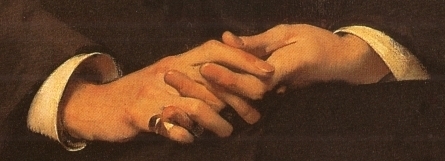
http://www.culture.gouv.fr/public/mis...
 Elizabeth wrote: "Eugene: This is why Moncrieff is so good: in his translation, the Baron says, "I could see at a glance that you were not used to Society." See? One hardly feels the knife go in..."
Elizabeth wrote: "Eugene: This is why Moncrieff is so good: in his translation, the Baron says, "I could see at a glance that you were not used to Society." See? One hardly feels the knife go in..."J'ai tout de suite vu que vous n'aviez pas l'habitude Proust.
Even more subtle.
And since we're on the subject, doesn't the narrator twist the knife quite subtly himself. Speaking of the Cambremers with whom he later dined and who remarked on the changes in La Raspelière including the draft excluders and the the tableware, he says, il est vrai qu'ils avouèrent que la vaisselle était belle. Pas plus que les choquants brise-bise, je ne l'avais vue.
Such things are unimportant to him a d he wants us to know it.
Books mentioned in this topic
Flaubert's Parrot (other topics)Proust connu et inconnu (other topics)
Cyrano de Bergerac (other topics)




